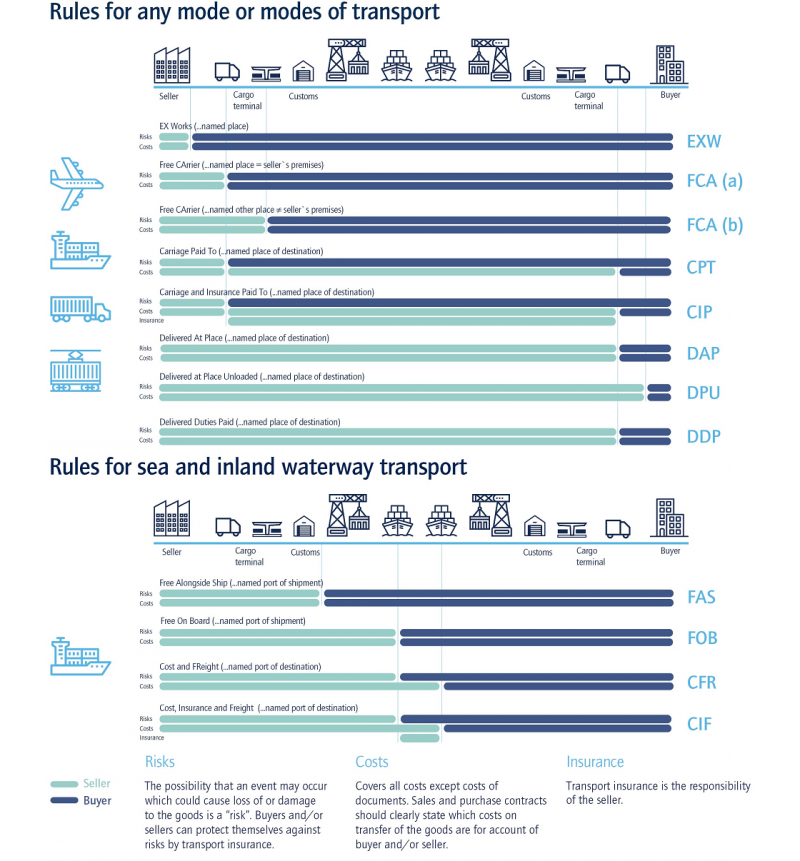Rules for any mode or modes of transport:
EXW – Ex Works (named place of delivery)
Often used when making an initial quotation for the sale of goods without any costs included, EXW means that the seller makes the goods available at their premises or at another named place (works, factory, warehouse etc). The seller does not need to load the goods on any collecting vehicle, nor does it need to clear the goods for export.
FCA – Free Carrier (named place of delivery)
FCA can have two different meanings, each with varying levels of risk and cost for the buyer and seller. FCA (a) is used when the seller delivers the goods, cleared for export, at a named place which is their own premises. FCA (b) is used when the seller delivers the goods, cleared for export, at a named place which is not their premises. In both instances, the goods can be delivered to a carrier nominated by the buyer, or to another party nominated by the buyer.
CPT – Carriage Paid To (named place of destination)
Under CPT the seller pays for the carriage of goods up to the named place of destination.
CIP – Carriage and Insurance Paid to (named place of destination)
Similar to CPT with the exception that the seller is required to obtain minimum insurance for the goods while in transit.
DAP – Delivered at Place (named place of destination)
The seller is deemed to have delivered when the goods are placed at the disposal of the buyer on the arriving means of transport and ready for unloading at the named place of destination. Under DAP terms, the seller needs to manage all risks involved in bringing the goods in.
DPU – Delivered at Place Unloaded (named place of destination)
This Incoterm requires that the seller delivers the goods, unloaded, at the named place. The seller covers all the costs of transport (export fees, carriage, unloading from main carrier at destination port and destination port charges) and assumes all risk until arrival at the destination place.
DDP – Delivered Duty Paid (named place of destination)
The seller is responsible for delivering the goods to the named place in the country of the buyer, and pays all costs in bringing the goods to the destination including import duties and taxes. The seller is not responsible for unloading.
Rules for sea and inland waterway transport:
FAS – Free Alongside Ship (named port of shipment)
The seller delivers when the goods are placed alongside the vessel (e.g., on a quay or a barge) nominated by the buyer at the named port of shipment. The risk of loss of or damage to the goods passes when the goods are alongside the ship, and the buyer takes on responsibility for all costs from that moment onwards.
FOB – Free on Board
The seller delivers the goods on board the vessel nominated by the buyer at the named port of shipment or procures the goods already so delivered. The risk of loss of or damage to the goods passes when the goods are on board the vessel, and the buyer takes on responsibility for all costs from that moment onwards.
CFR – Cost and Freight
The seller delivers the goods on board the vessel. The risk of loss of or damage to the goods passes when the goods are on board the vessel. The seller must contract for and pay the costs and freight necessary to bring the goods to the named port of destination.
CIF – Cost, Insurance and Freight
The same as CFR with the addition that the seller must also obtain minimum insurance cover against the buyer’s risk of loss of or damage to the goods during the carriage.


